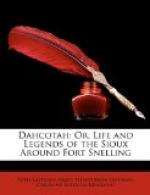The Dahcotahs do not worship the work of their hands; but they consider every object that the Great Spirit has made, from the highest mountain to the smallest stone, as worthy of their idolatry.
They have a vague idea of a future state; many have dreamed of it. Some of their medicine men pretend to have had revelations from bears and other animals; and they thus learned that their future existence would be but a continuation of this. They will go on long hunts and kill many buffalo; bright fires will burn in their wigwams as they talk through the long winter’s night of the traditions of their ancients; their women are to tan deer-skin for their mocassins, while their young children learn to be brave warriors by attacking and destroying wasps’ or hornets’ nests; they will celebrate the dog feast to show how brave they are, and sing in triumph as they dance round the scalps of their enemies. Such is the Heaven of the Dahcotahs! Almost every Indian has the image of an animal or bird tattooed on his breast or arm, which can charm away an evil spirit, or prevent his enemy from bringing trouble or death upon him by a secret shot. The power of life rests with mortals, especially with their medicine men; they believe that if an enemy be shooting secretly at them, a spell or charm must be put in requisition to counteract their power.
The medicine men or women, who are initiated into the secrets of their wonderful medicines, (which secret is as sacred with them as free-masonry is to its members) give the feast which they call the medicine feast.
Their medicine men, who profess to administer to the affairs of soul and body are nothing more than jugglers, and are the worst men of the tribe: yet from fear alone they claim the entire respect of the community.
There are numerous clans among the Dahcotahs each using a different medicine, and no one knows what this medicine is but those who are initiated into the mysteries of the medicine dance, whose celebration is attended with the utmost ceremony.
A Dahcotah would die before he would divulge the secret of his clan. All the different clans unite at the great medicine feast.
And from such errors as these must the Dahcotah turn if he would be a Christian! And the heart of the missionary would faint within him at the work which is before him, did he not remember who has said “Lo, I am with you always!”
And it was long before the Indian woman could give up the creed of her nation. The marks of the wounds in her face and arms will to the grave bear witness of her belief in the faith of her fathers, which influenced her in youth. Yet the subduing of her passions, the quiet performance of her duties, the neatness of her person, and the order of her house, tell of the influence of a better faith, which sanctifies the sorrows of this life, and rejoices her with the hope of another and a better state of existence.
But such instances are rare. These people have resisted as encroachments upon their rights the efforts that have been made for their instruction. Kindness and patience, however, have accomplished much, and during the last year they have, in several instances, expressed a desire for the aid and instructions of missionaries. They seem to wish them to live among them; though formerly the lives of those who felt it their duty to remain were in constant peril.




